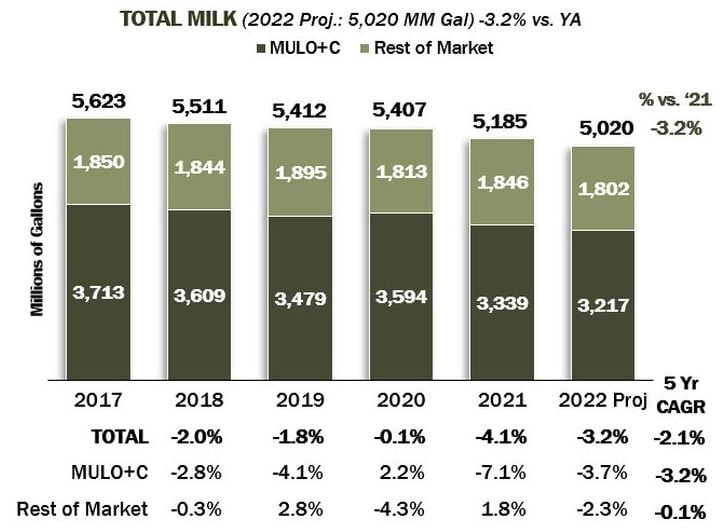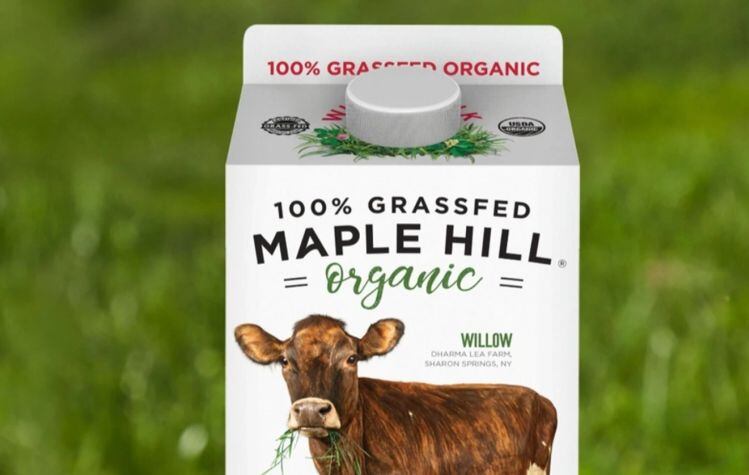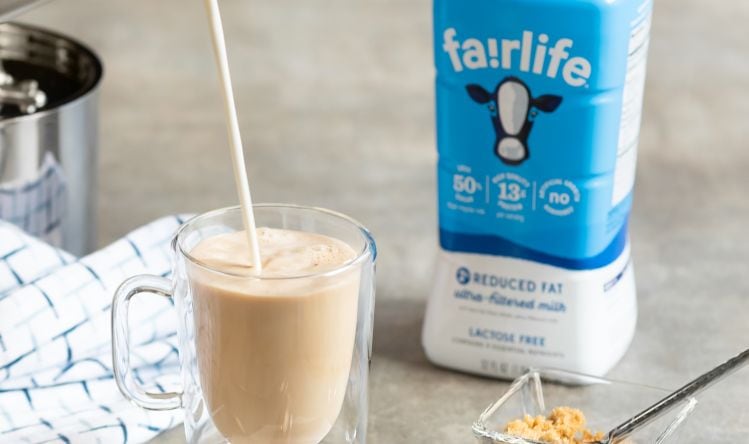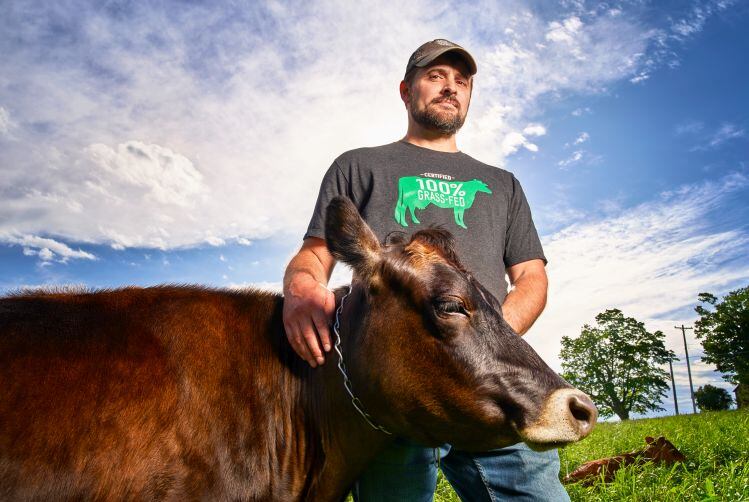“As a privately held company, we don't share detailed financials, but the business will probably grow about 10% this year,” said Hau a former Danone and Unilever exec who joined as chief financial officer in May 2021, and assumed the role of president (on top of his duties as CFO) in August this year.
“The grass-fed segment will be relatively flat on volume this year, although we will do a little bit better than that because we’re gaining share, but a chunk of growth is coming from pricing, which is going to slow volume growth. But we think that's a temporary situation; we continue to grow at a faster clip than the industry with more distribution coming, so we're excited.”
Weathering the inflationary storm
And while there are risks to having a premium positioning at a time when consumers’ budgets are tight, Maple Hill consumers tend to be a little more affluent and better able to weather inflationary pressures, he said.
For some of its loyal fans, he said, the calculation is: “I've got so much money that I'm willing to spend and I tend not to be willing to compromise on things like dairy, fruits and vegetables, and some meats, but maybe I’ll spend a bit less on that jar of spaghetti sauce or I'll buy the bigger pack of lunch meat. So I’ll spend money on grass-fed organic milk because that's really important to me, and I'll cut back somewhere else.”
COGS: ‘One advantage we have on the grass-fed side is the critical shortages that we've seen in fertilizers and even in commodity grains aren’t issues’
As for cost of goods, he said, Maple Hill is still facing rising costs, but at least bypasses the resources used to produce the corn, soybeans, or grains fed to conventionally-raised dairy cows, as grass-fed cows produce manure, which feeds the soil that grows the grass they eat.
“One advantage we have on the grass-fed side is the critical shortages that we've seen in fertilizers and even in commodity grains aren’t issues [because dairy cows supplying Maple Hill eat grass], but the price of oil has hit us and our farmers because it costs more to transport milk throughout the supply chain plus there's the higher energy costs in production and packaging that are affecting everyone.”
So how has Maple Hill tackled pricing?
“On milk, we took a shot last year which hit the shelf at the beginning of this year," said Hau, "and we are desperately trying to avoid taking any more because you start to get to a price point that’s hard on the consumer. We took a little bit on our cultured products late last year, and we're going to take a little bit more here in the next few weeks. But we're trying to keep prices as low as possible.”
Retailers, he said, have been “pretty understanding of the difficulty everyone is having, but they want justification. We don't share our specific costs, necessarily, but we will show them that our fuel prices have gone to X so our energy prices have gone to Y.”
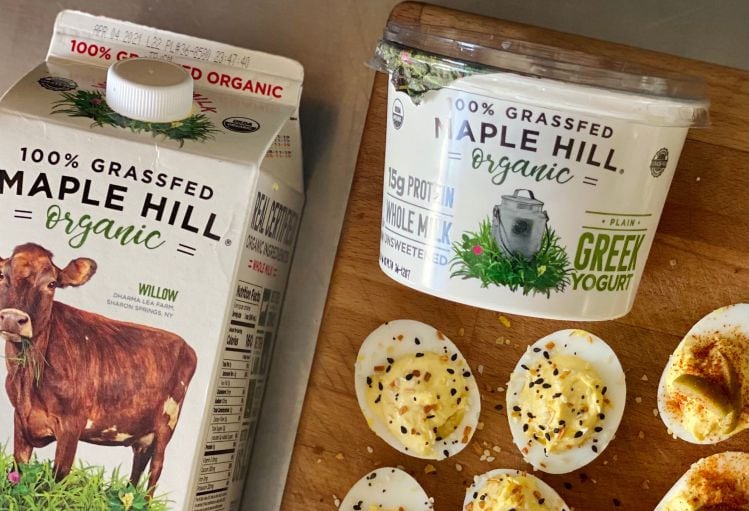
‘The Maple Hill consumer tends to be what I'll call a purist’
So how are retailers thinking about their dairy sets, and where does Maple Hill – which sells milk, kefir and yogurt procured from organic farms in Upstate New York in around 8,000 stores including Whole Foods, Kroger, Walmart, Sprouts, and Safeway – fit in?
“If you’re a retail buyer,” said Hau, “you're always looking for innovation, for something to spark the category. And for a long time, it was plant-based beverages, but it's gotten a little bit tired right now, there are so many different brands and so many different types.
“And then you've got plain old-fashioned dairy milk. What's revived it a bit is value-added milk: organic and now with grass-fed it’s a bit of innovation that allows the dairy buyer to put something different on their shelf. The Maple Hill consumer tends to be what I'll call a purist. They say give me the cleanest purist high-quality plain milk or yogurt and then I’ll decide what to do with it and flavor it in a way that works for me; I just want something that's good for me, natural and healthy. And that's what grass-fed can offer.
“When people started buying organic, the world kind of woke up and said, Hey, this is a better way of dairy farming, and what we've done with grass-fed, we've taken that to the next level and said,

It’s not brilliantly innovative. It’s just going back to the way nature intended so you're getting the most natural product possible.”
Organic vs grass-fed vs 100% grass-fed
But do consumers know the difference between, say, organic milk (USDA Organic standards require that, during the grazing season, all organic dairy cows spend a minimum of 120 days on pasture and receive at least 30% of their diet from fresh pasture grasses); grass-fed milk (not defined); and Maple Hill's certified 100% grass-fed organic milk (cows that eat grass most of the year and hay (dried grass) and baleage (fermented high-moisture grass) in the winter)? Click here to read more about the certification.
“There are people that understand that but it’s not widely understood, which is where the growth opportunity comes,” said Hau.
“The early adopters are the most educated, but as we grow the business, we have to go after those people who aren't going to take the time and the energy to research online, they are walking up to the shelf and looking at the front panel and deciding which one to buy.
"So we've got to increase our education and our marketing to those consumers, particularly the ones that are already buying organic.”
‘I think you're not going to get to a point where all dairy is produced by grass-fed animals’
As for ‘regenerative,’ the new buzzword in food marketing, it’s always been part of the DNA of the Maple Hill brand, which is committed to regenerating the soil, supporting wildlife biodiversity, sequestering carbon and limiting pollution of waterways, claimed Hau.
“A big opportunity for Maple Hill is we're not going out and purchasing more sustainable ingredients; the very nature of our product is sustainable and regenerative. We don't use feed, we don't till soil and release carbon into the air, and our farmers go to great pains to make sure they are taking the best possible care of the land and that the soil is as rich and productive as it possibly can be.”
But asked about studies suggesting we’d need multiple planets to raise all the animals to support even current meat and dairy consumption using grass-fed systems, he said: “I think you're not going to get to a point where all dairy is produced by grass-fed animals.
“But we can expand and grow it. So were recently recipients of an USDA grant so we’re going to work with our farms to enhance climate-friendly practices.”
USDA is not handing out blank checks
So how does he respond to commentators suggesting that USDA has been handing out checks to pretty much anyone using the word ‘regenerative’ in a pitch to the Partnerships for Climate-Smart Commodities program, and how much oversight is there for the $2.8bn in funding?
“So there's a couple of things,” said Hau. “One, you had to you had to lay out the thesis. Then the actual grant itself will be determined through a negotiation process with the USDA where you have to explain exactly what it is you're doing, how you're going to spend that money, and then how much money they're going to give us. And then they'll lay out, I believe, legal contracts.
“I can’t speak for anyone else, but for our grant, it's not cash up front, you have to go do the things and then submit receipts, effectively. And as we grow and increase our sales, we will increase the number of farms doing it [using more climate-friendly practices].”
Ultra-filtered zero sugar milk dropped… but could return
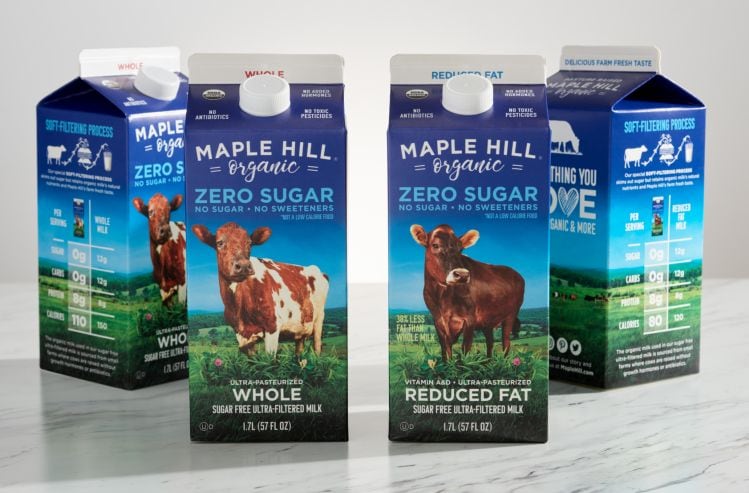
So what’s worked and what hasn’t worked from an innovation perspective for Maple Hill, which now makes milk, kefir, yogurt and butter?
All of the above lines are performing well, said Hau, who said the most recent innovation: ultra-filtered ‘zero sugar’ milk, a first for the industry – has been dropped, but not because it didn’t resonate with shoppers, he stressed.
Noting that other players including Chobani and Organic Valley have also ditched their ultra-filtered lines recently, he said: “Unfortunately, we had to pull it off the market. We ran into some issues from a supply standpoint, finding somebody to be able to process it in the volumes that we needed.
"So we pulled it off the market, but we still have the proprietary intellectual property and we're looking at options for maybe coming back out with that in a relaunch.”
Distribution opportunities
When it comes to distribution, he said, Maple Hill has listings at most major retailers, but not necessarily in every store: “There are still a few retailers that are high on our list that we want to take up, but there's a big opportunity to expand distribution with existing customers, so our argument to Kroger is that if it's working in King Soopers, it'll work in Fry’s, so there's still a lot of low hanging fruit in the traditional grocery players.
“There are also opportunities in food ingredients so things like baby formula, as grass-fed develops, and premium products in multiple categories.”
Exit strategy for investors
Asked about the exit strategy for Maple Hill’s investors such as Sunrise Strategic Partners, he said: “I say companies - like my house - are always for sale at the right price, but that doesn't mean we're out there trying to sell it.
“This is a growing category and we've been blessed with a group of investors who believe in the category, believe in the product, and think there's a lot of ground to be made, so we are still in that investment phase and growing the business.
“If we can convince more consumers that there's an up trade here that's worth their time and their money. And if we do that, then the whole business becomes more valuable to everybody.”
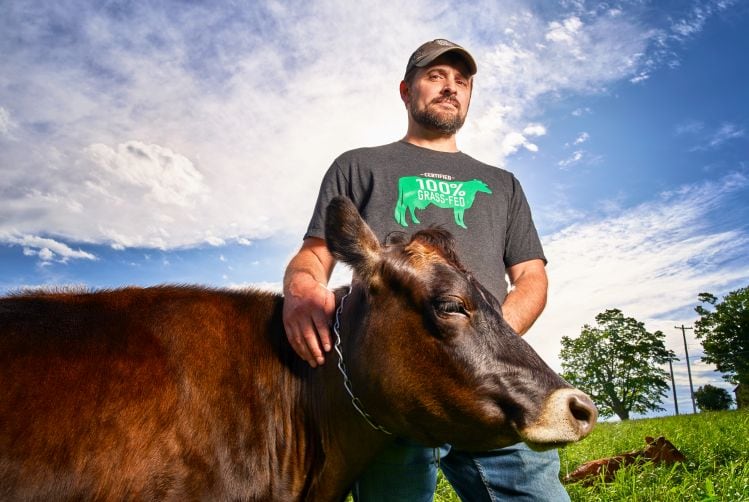
Formed in 2009, New York state-based Maple Hill makes milk and other dairy products from 100% grass-fed organic milk sourced from 130+ family farmers in New York State. Its products are manufactured by third parties.
As the term ‘grass-fed’ is not legally defined, no two grass-fed claims are the same, which is misleading consumers and creating an uneven playing field, claimed Maple Hill founder Tim Joseph, who said consumers assume, not unreasonably, that 'grass-fed' means exclusively grass-fed, in an interview with FoodNavigator-USA in 2019.
“Without a third-party certification, consumers cannot be certain of how much grass the cows actually are consuming, which is why we’ve worked with Organic Valley to develop the new certified grass-fed organic dairy seal, which you’ll start seeing on products soon.”
To qualify, all animals receive 60% of their dry matter intake from pasture over at least a 150-day grazing season (as opposed to 30% and 120 days per the National Organic Program standards), he said.
“What we need now is the gatekeepers in the system - the retailers and distributors - to start asking more questions about grass-fed claims from their suppliers and require verification just as they do with any other claim.”
